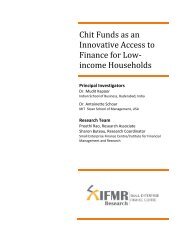Government of India Volume I: Analysis and Recommendations
Government of India Volume I: Analysis and Recommendations
Government of India Volume I: Analysis and Recommendations
You also want an ePaper? Increase the reach of your titles
YUMPU automatically turns print PDFs into web optimized ePapers that Google loves.
ANNEXES<br />
(c) Pledged shares <strong>and</strong> exemptions from the Takeover Code: When the underlying<br />
security, which has been acquired by an ARC, are shares held in dematerialised<br />
form, there are no statutory provisions or regulatory guidelines allowing<br />
substitution <strong>of</strong> the ARC in place <strong>of</strong> the original lender. This leads to complications<br />
<strong>and</strong> excessive procedural requirements. Further, while banks <strong>and</strong><br />
financial institutions have been exempted from the Securities <strong>and</strong> Exchange<br />
Board <strong>of</strong> <strong>India</strong> Substantial Acquisition <strong>of</strong> Shares <strong>and</strong> Takeover, Regulations,<br />
2011 (Takeover Code), for pledged shares held by them, similar exemptions<br />
have not been made applicable to ARCs. This WG recommends that substitution<br />
<strong>of</strong> ARCs in place <strong>of</strong> the original lender, <strong>and</strong> the exemption from the applicability<br />
<strong>of</strong> the Takeover Code must be allowed. This would however require<br />
appropriate amendments to sub-ordinate legislation by SEBI <strong>and</strong> Ministry <strong>of</strong><br />
Company Affairs, <strong>Government</strong> <strong>of</strong> <strong>India</strong> (MCA), as applicable.<br />
(d) Modification <strong>of</strong> charges: Companies which mortgage their assets are necessarily<br />
required to intimate the Registrar <strong>of</strong> Companies (ROC) to assist in case <strong>of</strong><br />
insolvency/winding up. However, currently dormant companies (companies<br />
who have not complied with filing <strong>of</strong> annual returns among other things) are<br />
not allowed to change or modify their charge registers in light <strong>of</strong> recent notifications<br />
<strong>of</strong> the MCA. 3 This leads to a situation where if the assets <strong>of</strong> the dormant<br />
company are securitised <strong>and</strong> transferred to ARCs, the names <strong>of</strong> ARCs cannot<br />
be substituted leading to difficulties in enforcement proceedings/insolvency<br />
<strong>and</strong> winding up cases. This WG is <strong>of</strong> the opinion that modification <strong>of</strong> charges<br />
<strong>and</strong> exemptions in case <strong>of</strong> ARCs acquiring NPAs <strong>of</strong> dormant companies must<br />
be allowed. This would however require appropriate clarifications by the MCA.<br />
(e) Central Registry: The Central <strong>Government</strong> has set up a central electronic<br />
registry under SARFAESI effective from March 31, 2011 to prevent frauds in loan<br />
cases involving multiple loans from different banks. The central registry is<br />
maintained by Central Registry <strong>of</strong> Securitisation Asset Reconstruction <strong>and</strong> Security<br />
Interest <strong>of</strong> <strong>India</strong> (CERSAI) under SARFAESI. The registration <strong>of</strong> charges can<br />
be done online <strong>and</strong> search <strong>of</strong> the records <strong>of</strong> the registry can be done by any<br />
person online. This WG is <strong>of</strong> the opinion that the scope <strong>of</strong> the registry must<br />
be exp<strong>and</strong>ed to include encumbrance over any property <strong>and</strong> not just those<br />
which are mortgaged to banks or financial institutions. In addition all existing<br />
registration systems such as l<strong>and</strong> registry <strong>and</strong> filings with the registrar <strong>of</strong><br />
companies, must be integrated with the central registry so that encumbrance<br />
on any property (movable or immovable or intangible) is recorded <strong>and</strong> can be<br />
verified by any person dealing with such property.<br />
19.10.4. List <strong>of</strong> Acts governing the <strong>India</strong>n banking sector<br />
1. Banking Regulation Act, 1949<br />
2. Banking Companies (Acquisition <strong>and</strong> Transfer <strong>of</strong> Undertakings) Act, 1970 (applicable<br />
to banks nationalised in 1970)<br />
3. Banking Companies (Acquisition <strong>and</strong> Transfer <strong>of</strong> Undertakings) Act, 1980 (applicable<br />
to banks nationalised in 1980)<br />
4. Companies Act, 1956 (to a limited extent)<br />
5. Reserve Bank <strong>of</strong> <strong>India</strong> Act, 1934, rules, guidelines, master circulars, <strong>and</strong> regulations<br />
made thereunder<br />
3 The Ministry <strong>of</strong> Company Affairs through General Circular 33/ 2001 dated June 1, 2011 notified that unless a company<br />
files its updated balance sheet <strong>and</strong> pr<strong>of</strong>it <strong>and</strong> loss account it will not be able to file any event based compliance<br />
forms, including for modification <strong>of</strong> charges.<br />
FINANCIAL SECTOR LEGISLATIVE REFORMS COMMISSION 191



